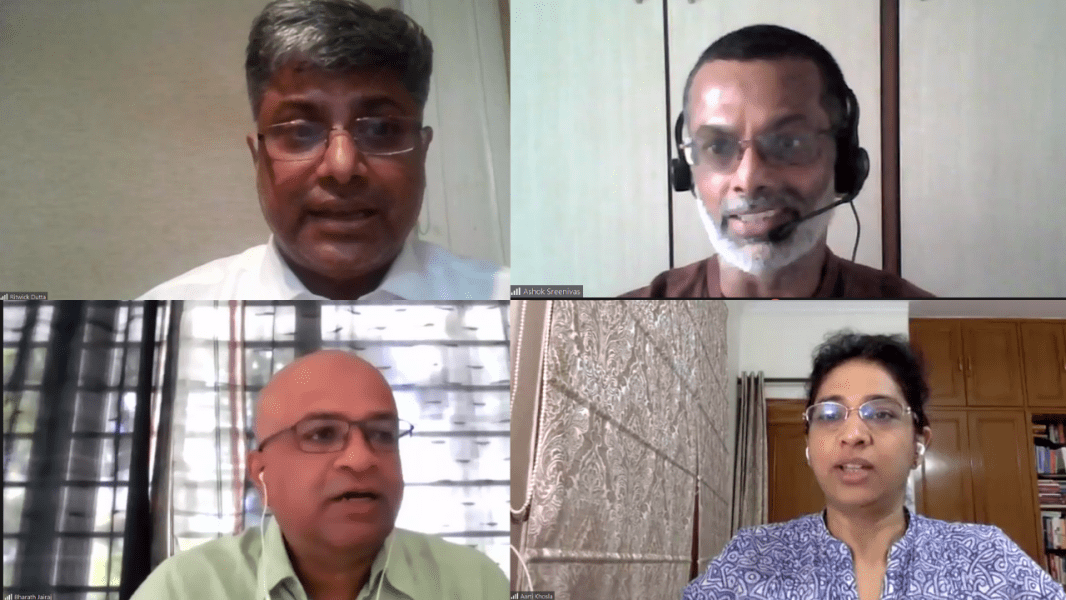
Delhi 15/9/21: Climate Trends and Arthan are organizing a series of online forums to discuss the interlinkages between climate change and social, political, and governance issues in India. This is an attempt to mainstream discussions about climate change with the wider social sector and work together to find common solutions that address their social cause, as well as contribute to climate action.
The second forum in this three-part series was organized titled ‘Strengthening Equity and Governance to Converge Climate Action and Sustainable Development’. It explored the role of institutions and governance in strengthening climate action, the political, regulatory, and legal barriers to a clean energy transition, and the opportunities for women empowerment in India’s clean energy transition.
Speaking in the session on Understanding Regulatory, Legal and Political Barriers to a Clean Energy Transition, Ashok Sreenivas, Senior Fellow, Prayas, Energy Group said, “At the end of the day, this energy transition needs to benefit people. We need to be conscious that we don’t build unjust elements into the new energy world. Large-scale solar parks and hydro projects also have social and environmental implications, just moving away from coal doesn’t absolve us from our environmental responsibilities. India must ensure it doesn’t repeat the same mistakes it did when pushing for the rapid growth of the existing energy sector”. Other speakers included Bharath Jairaj, Director, Energy (World Resources Institute India), and Ritwick Dutta, Founder and Managing Trustee (Legal Initiative for Forest and Environment). They highlighted some key points about the need to ensure RE projects are acceptable to communities living around the sites, only then would this transition be “just”. India’s regulatory agencies need to have a better understanding of the likely risks and opposition that can arise from communities.
Speaking in the session that discussed Women’s Economic Empowerment and Opportunities for Climate Action, Sabina Dewan, Executive Director, JustJobs Network said, “India doesn’t fare well on gender equity. Women’s labor force participation rate is low and has been falling — it stood at just under 23% in 2019-20 (PLFS). The pandemic has not only significantly worsened the situation for women but has also shown us that shocks have a disproportionately adverse effect on women. India’s energy transition has the potential to generate economic opportunities for women, but to avail them women must be given access to appropriate education and training. And we must ensure that as these new opportunities are created, women are not relegated to the low rungs of the value chain, but that they have a chance to participate in the high value add activities as well. Without conscious attention to enabling women’s empowerment, addressing climate change will inevitably suffer”. Other speakers included Nisha Dhawan, Country Director, India (EMpower), Smitha Hari, Vice President, Sustainable Finance, and ESG (auctusESG LLP, India). They made pertinent points about the need to consciously view upcoming jobs in the energy sector as gender-neutral and plan on skilling and education programmes to involve women. They highlighted that decentralized Renewable Energy systems have huge livelihood potential for women, but India fares much lower than the global average even there – only 11% of the rooftop solar workforce is women, compared to 32% global average.
Speaking in the session on Creating Effective Institutions for Lasting Change, Vaibhav Chaturvedi, Fellow, Council on Energy, Environment and Water-CEEW said, “The mitigation debate is essentially an economic transformation debate. Climate action will be much more functional and effective under an institutional framework in which climate is seen as an economic imperative. Only then can we ever mainstream the debate about climate change and engage players outside the environment sector”. Other speakers included Jasmer Dhingra, Senior Program Officer, IDH, The Sustainable Trade Initiative, and Aditya Valiathan Pillai, Associate Fellow, Centre for Policy Research. They highlighted the importance of creating climate-resilient infrastructure and the need for consultation and a partnership-based approach. Consultations with ground communities can help various institutions prepare themselves for how certain changes are going to impact them. They also threw light on the need for institutions not just for processing but also for mediating social and political dynamics.


